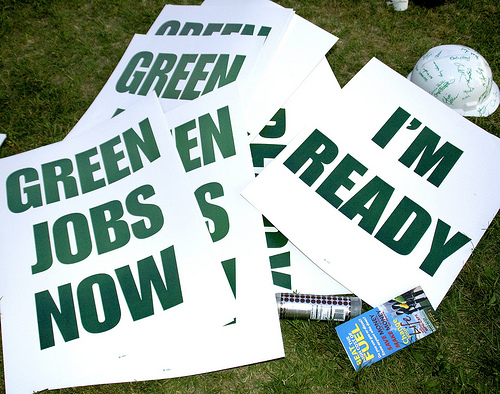Just about exactly a year ago, patient readers with long memories may remember, I received a sobering New Year’s Day message. “Today,” it began arrestingly, “is arguably the first day of the most important year in human history.”
 Once again, the climate clock is ticking…The message — sent to a who’s who of top officials on both sides of the Atlantic, was from Prof. Tom Burke, a close adviser to three successive British Conservative environment secretaries in the 1990s, and one of Europe’s shrewdest observers of green politics.
Once again, the climate clock is ticking…The message — sent to a who’s who of top officials on both sides of the Atlantic, was from Prof. Tom Burke, a close adviser to three successive British Conservative environment secretaries in the 1990s, and one of Europe’s shrewdest observers of green politics.
He was referring, of course, to the recent Copenhagen climate summit, which he told us “would do more to shape human history for longer” than any other meeting in world history. The reason? “Climate change is forever,” its nature such that “the future cannot redeem today’s mistakes.” He added: “We have one chance to reach a political agreement to reduce carbon emissions in time to stay safe. This is the year in which we take that chance.”
Or not, as it turned out.
Burke’s words stuck with me throughout the fiasco that the summit became. Indeed, on its last day I woke up thinking, “If Tom is right, this is the most important day ever.” In a sense, it lived up to that billing, with key world leaders — including President Obama, Britain’s Gordon Brown, Germany’s Angela Merkel, France’s Nicolas Sarkozy, Brazil’s Luiz Inácio Lula da Silva, and Mohammed Nasheed of the Maldives — personally negotiating an agreement line by line. But even they accepted that the “accord” that resulted fell far short of what is needed.
So I kept a special eye on my inbox this new year to see if Burke would send another missive. It never came. Meanwhile, I came across an article he recently published in ENDS, perhaps Britain’s most authoritative environmental journal. Its message was just as uncompromising. “It will take a while for the full magnitude of the calamity that has befallen the world to become clear,” he wrote. “But calamity it is.”
He went on: “Not one of the 119 world leaders who attended the Copenhagen summit came intending to shatter a global climate regime so painfully built up over 20 years. But that is what they accomplished”
The “core elements” of a deal that would have kept global warming beneath 2 degrees centigrade “were within view, if not within grasp, before the meeting began,” Burke added. “A little more movement on emissions reductions, a bit more money on the table, and a real foundation could have been laid. By the end, enough had moved on both those central issues for a deal to have been grasped, But so sour had the mood become, and so chaotic the process, that it slipped from the hand.”
I agree with Burke about how close agreement was when the conference opened and that, even though the formal negotiations got nowhere, there was enough movement (not least in the Americans’ unexpected agreement to endorse a $100 billion-a-year fund for the poorest nations) to have made it possible to seal the deal. I agree, too, that the sour atmosphere at Copenhagen — founded on deep mistrust arising from decades of broken promises, enhanced by the poor chairmanship and chaotic organization of the summit, and exploited by a few countries to frustrate progress — was the principle reason for the summit’s failure.
But I am not so gloomy about the outcome. I place some faith in the very readiness of the leaders to work painstakingly throughout an entire day to try to get a worthwhile agreement. Burke dismisses this as itself “a recipe for disaster” with “getting out of town with the right headline” being “the most urgent priority” for the Obamas and Merkels in attendance.
Yet, far from contenting themselves with concocting a face saving press release, the leaders almost pulled something off. Had China not issued a last minute veto of the accord’s most important elements — notably a 50 percent global reduction in emissions by 2050, and a commitment to work on producing legally-binding treaty — there would have been something valuable to build on, an extraordinary achievement in the circumstances.
Many of the leaders, including all those listed above, have demonstrated a personal commitment to tackling climate change that in almost every case goes beyond what either their political parties or their electorates are demanding (the exception is President Nasheed, but only because his people are just as desperate as he to prevent their country’s extinction at the hands of rising sea levels).
All, too, have taken steps to reaffirm that commitment since Copenhagen. And, in another hopeful straw in the wind, China’s vice foreign minister, He Yafei — one of the main figures blocking progress at the summit — has just been pushed out, suggesting at least that his government is embarrassed by the blame it has attracted.
Such experienced observers as David Doniger of the Natural Resources Defense Council, Jennifer Morgan of the World Resources Institute, and Alden Meyer of the Union of Concerned Scientists also take a more optimistic view. Burke dismisses such people as “shell-shocked survivors of a political hurricane, picking over the disaster site for any useful fragments of their past existence.”
But these experienced NGO hands have realistic hopes for the next twelve months, ending in another attempt at finalizing a global climate agreement in Mexico.
So maybe Burke’s message was off by a year, making 2010 is the “most important” year of all.



